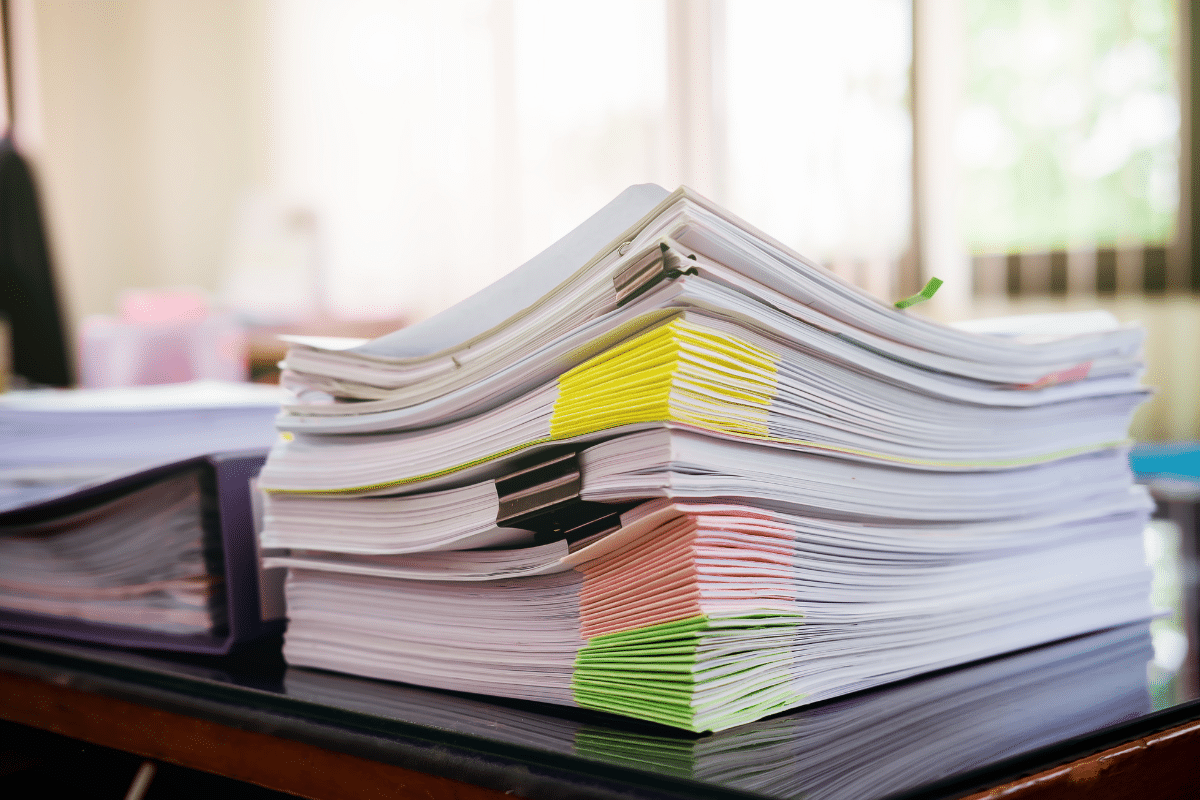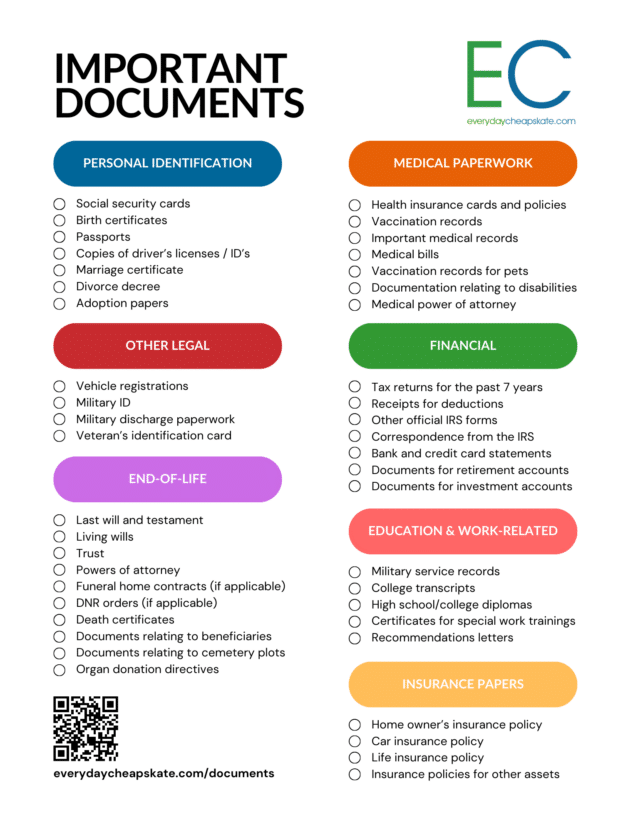Important Documents Every Family Should Keep to Be Safe Not Sorry
Take control of your paperwork chaos and be prepared for whatever comes your way. Here is the ultimate checklist of important documents—from personal identification to financial records and end-of-life plans—that every family should keep to be safe, not sorry. Plus, don’t forget to download my freebie checklist PDF to help you stay organized and ensure you have all the necessary documents on hand.
I receive a lot of informative mail from my dear readers, but none can top the letter from Bob Ford about the important documents every family should keep …
Good planning
Meet Bob Ford, Certified Retirement Planner, and volunteer teacher for the Retirement Planning Group of Southern California—an organization that offers free seminars on all aspects of retirement planning.
When Bob began teaching retirement planning he had a relatively short list of important documents he believed every family should keep in a locked safe, deposit box, or home safe with a minimum fire rating of two hours.
When teaching teaches the teacher
Over the years, Bob’s list has grown because, with each class, he learns of another document that, if kept, would have saved someone a lot of time, money, or both.
The list grew and grew …
Each addition Bob has made to his list represents a sad real-life situation that might have been avoided had the proper records been kept. One of those stories follows the list:
- Certified birth certificates for every person in your family
- Certified death certificates for any deceased members, including all details and documentation regarding the death
- Marriage certificates and all specific details for each married member of your family.
- A photocopy of each family member’s current driver’s license.
- Divorce papers for any person in your family who’s been divorced.
- A copy of the letter to all credit card companies telling them you are not responsible for the credit card debts of a former spouse(s) and a certified mail receipt from the credit card company showing the letter was received.
- Naturalization and adoption papers as applicable.
- Each family member’s Social Security card. Carry a photocopy.
- A copy of all child support and alimony awards with complete details.
- Your family Bible if it contains family records.
- Records and documentation regarding any commission in the armed services including discharge and retirement certificates.
- Proof of important payments such as canceled checks for federal, state, and county taxes.
- W-2s and income tax forms.
- Family members’ passports.
- Details and physical location of all your stocks and bonds and the name, address, and phone number of your stockbroker.
- Your account numbers and the amount you paid for each stock and bond (cost basis).
- The location of the original copy of your will and a photocopy of it.
- A videotape of you reading your will with the current day’s newspaper visible to establish the earliest possible date of the video recording
- The names, addresses, and phone numbers of the persons who witnessed the signing of your will.
- The details of anything you received as a result of someone’s will.
- The name and address of the person who will administer your estate.
- All insurance policies that you currently have with the name, address, and phone numbers of your insurance companies and canceled checks that paid the premiums.
- Names, addresses, dates of birth, and social security numbers of all former spouses and the length and dates of your marriages.
- The addresses and full names of non-family members who are mentioned in your will.
- The deeds to any real estate you own and the original purchase prices. County records have copies of all of these deeds.
- The escrow papers of all real estate you have purchased or sold.
- The receipts for major repairs to your home.
- All building permits for properties you currently own or have owned.
- Any promissory notes that you own or owe with complete details of the names, addresses, and what and why the transaction occurred.
- The Grant Deed, Trust Deed, and Deed of Full Reconveyance of your real estate.
- The title (pink slip) to all family automobiles.
- The names of any trusts for which you are the trustee and the original trust documents.
- The trustee’s name and address in any trust where you are the beneficiary and a copy of the trust document.
- A separate full-face color photo of yourself, your spouse, and each child with this phrase on the back. This is a picture of (full name and relationship) on (current date)
- A list of all the names you have had in your lifetime, when you had those names plus identification you had when you used the name.
- A copy of any court order that changed your name.
- The complete names of your parents including your mother’s maiden name.
- The names of your biological parents if you are adopted (if known).
- The full details of any children you have given up for adoption.
- The names of all pension plans that you were ever a member including the name of the employer and dates of employment.
- The names and addresses of every place you have ever worked.
- Exterior photos of all sides and yard areas of your house or land.
- Receipts for all furniture, major appliances, or items that cost more than $100.
- The details of any insurance settlements, lawsuits, lottery winnings, or annuities that are or will be paid to you over a period of time.
- The names and details of any partnerships or corporations in which you are a partner or director.
- Photos or a videotape of every room in your home showing the contents of each room including the garage.
- A household inventory which includes the price paid for each item.
- Photos of each of your automobiles, both interior and exterior.
- A record of inoculations for each member of your family.
- The specific location of all family medical and dental records.
- College diplomas, transcripts, and awards for each member.
- Any patents you hold.
- Details of any accidents you’ve had, a copy of the police report, and the claim number of any insurance settlement.
- The serial number of all guns, appliances, or items you own which have serial numbers.
- A copy of the fingerprints of each of your children, yourself, and your spouse.
- The name and address of every entity that sends you a pension check
- Anything that says Pay to the Bearer (bonds, checks, etc.)
- The address, account number, and phone number for each credit card account.
- A full description of anything stolen from you, the date, and value.
- The blood type of yourself, your spouse, and each child.
- The details of any major surgery including the doctors, the name and address of the hospital, the name of the manufacturer or any medical device implanted, where it was implanted, who implanted it, and why.
- A copy of anything that has your notarized signature.
- A photocopy of medicare cards.
- Cash and expensive gems (not recommended for home storage).
- Pictures and other objects that have great sentimental value.
- Negatives of important photos.
- Any licenses, permits, or certifications of family members.
- Copies of any contracts or agreements you have signed.
- Your instructions (Health Directive) regarding life support systems signed and dated.
- An appraisal and photo of anything that has unusual value.
- The release of liability from all contractors that worked on your house.
- All warranties and receipts for things you have purchased.
- The buyers’ names, addresses, license numbers, and copies of bills of sale regarding automobiles.
- Details about and photos of anything that is one of a kind and cannot be replaced.
- The location and details about ammo and firearms. They are very dangerous in a fire.
- All service contracts and the phone number to call for service.
- The details regarding any illegitimate children you have had.
Steady, pal
Before you fall out of your chair having just slogged through this very long list, realize that not every person would have every one of these items as each of our life situations are very different. But let this inform each one of us of the need to keep good records, recall those events we’ve forgotten and documents we may have lost, and then stay on top of things going forward.
Too eccentric?
Do you think such detailed records and organization given to us by Bob Ford are a bit eccentric? I’m sure a man we’ll call John Doe did, too. Here’s his true story …
Meet John Doe
John died about five years before receiving the letter from Bob. Mr. Doe’s Will was still in probate.
John Doe was a prominent member of the community, an elder in his church, and even had a wing of the church named for him. He’d had a private audience with the Pope and his picture taken with several U.S. presidents, including President Reagan from whom he also had a personal, hand-signed letter.
John had a well-known dislike for lawyers. Rather than pay for legal advice in writing his Will, he drafted it himself—in his own handwriting, on a single sheet of paper.
And then he died
Upon his death, Doe’s estate was worth $20 million. His holographic Will read:
“I leave each of my children $3 million and the rest of my estate to my wife.” John had 4 children.
Soon after his death, the Will was, by law, filed with the probate court, which made it a public document. Only days before probate was complete, Bill Jones (not his real name) contested John Doe’s Will. Bill claimed he was John’s son and demanded his $3 million.
Outraged!
John’s family was outraged because John had been married to only one woman for 40 years. After all kinds of legal proceedings, Bill got the probate judge to order John’s body exhumed and DNA tests run to determine if John was Bill’s father. To everyone’s surprise, the results were affirmative.
Because, according to John’s Will, he left “$3 million to each of his children” and Bill was John’s son, the family agreed to give him $3 million. Of course, this amount would come from the wife’s share of the estate.
Then there were three
Just before the revised Will was to complete probate, there were two more contestations of the Will by two women also claiming to be John’s progeny.
They hired Bill’s lawyer to help them prove their position in the will. Over the family’s objections, John’s body was again exhumed for DNA samples (apparently, they didn’t get enough DNA the first time around?) and they, too, were found to be John’s children.
Stalled
That is where the case stands now. If you do the math, seven people cannot receive $3 million each from a $20 million estate with anything left for the wife. And who will pay the legal fees? What a mess.
It could have been simple
If John had included complete information in his Will giving the three children not from his wife $1 each, much pain and suffering could have been avoided. If he would have put his property in a Trust, none of this would have become public.
The pain and embarrassment John thought he was sparing his wife before his death was nothing compared to what she’s suffered by having John exhumed twice and then seeing every detail being made public and reported in the local newspaper.
I realize this story is extreme, but it got my attention and I’ll bet it gets yours, too. Now is the time to get our important papers organized and into a safe place.
How to get started
Good preparation is about the best and cheapest insurance available.
Births, deaths, marriages, divorces, deeds, wills, and bankruptcy filings are examples of matters of public record. Each of these events is recorded in the Office of the County Recorder where the event occurred. You can call, write, or go online to contact that office for specific information on how to obtain certified copies of your important documents. Prepare for a long haul. Let patience prevail as this kind of research can get complicated. Just don’t give up.
Get a safe
Bob Ford recommends a home safe with a minimum fire rating of 2 hours. While you have many choices, this is the home safe I own, and highly recommend.
Additionally, consider this safe specially designed for documents to ensure optimal protection.
Overwhelmed?
If Bob Ford’s list has thrown you into a state of overwhelm, I get it. Me, too! What follows is a more straightforward list, that while extensive, should help both of us get our heads around what we need to do.
Personal Identification Documents
- Social security cards
- Birth certificates
- Passports
- Copies of driver’s licenses or identification cards
- Marriage certificate
- Divorce decree
- Adoption papers
Other Legal Documents to Keep
- Vehicle registrations
- Military ID
- Military discharge paperwork (DD 214)
- Veteran’s identification card
Important Medical Papers to Keep in Your Files
- Health insurance cards and policies (including prescription insurance)
- Vaccination records
- Important medical records from major hospitalizations or surgeries
- Medical bills – especially if you claim medical expenses as deductions on your taxes
- Vaccination records for pets
- Documentation relating to disabilities
- Medical power of attorney
Financial Documents
- Tax returns for the past 7 years
- Receipts for items that were claimed on your taxes – You’ll need to keep these for 7 years also.
- Other official IRS forms that relate to your tax returns – Other forms to keep include things like W-2 forms, 1099’s, etc.
- Correspondence from the IRS like letters they’ve mailed you about tax credits, etc. – I would much rather have these on hand and not need them than need them and not have them.
- Bank and credit card statements – I use these to help with tax preparation each year.
- Documents for retirement accounts – 401K, IRA, etc.
- Documents for investment accounts – stocks, bonds, mutual funds
Insurance Papers
Most insurance companies send a new policy for each annual renewal (either paper copies through the mail or digital copies through email). For my insurance paperwork, I shred the old policy each time I get a new one. That way, I don’t have past policies cluttering my filing drawers.
Here are some insurance papers to keep:
- Home owner’s insurance policy
- Car insurance policy
- Life insurance policy
- Insurance policies for other assets like boats or RV’s
Education and Work-Related Papers
- Military service records
- College transcripts
- High school/college diplomas
- Certificates for special work trainings you’ve completed
- Letters or emails with recommendations or accolades – For instance, when a customer at one of my past jobs wrote an email to my boss expressing her satisfaction with my service, I kept the email with my other work-related documents. This can make a great reference in the future.
End-of-Life Documents
- Last will and testament
- Living wills
- Trust
- Powers of attorney
- Funeral home contracts (if applicable)
- DNR orders (if applicable)
- Death certificates
- Documents relating to beneficiaries
- Documents relating to cemetery plots
- Organ donation directives
Download your essential checklist of important documents
Don’t worry, I’ve got your back! To make things easier for you, I’ve created a handy PDF download of this checklist that you can keep for reference. It’s the perfect companion to help you organize your important documents and ensure you’re prepared for anything life throws your way.
EverydayCheapskate™ is reader-supported. We participate in the Amazon Services LLC Associates Program and other affiliate advertising programs, designed to provide a means for us to earn from qualifying purchases, at no cost to you.
More from Everyday Cheapskate
Please keep your comments positive, encouraging, helpful, brief,
and on-topic in keeping with EC Commenting Guidelines
Last update on 2024-04-26 / Affiliate links / Images from Amazon Product Advertising API


















In lieu of a safe which wasn’t large enough for my husbands and my wills I store them in doubled up plastic ziploc bags and placed in our upright frost-free freezer. No problems if there is ever a fire or from any water damage.
Wow! Such great information! Thank you.
Wow. I’m overwhelmed.
as a widow, I’ll have to search for some of this info that hubby took care of. Something we should have organized before he passed. Well, no time to start like the present.
thank you.
I was just getting ready to purchase this box and checklist for the items you list above.
Do you have any input and/or recommendation for Nok Box? Thanks for all you do, I’ve followed for years!
I don’t, Laura … but it looks interesting and I will look into it. Thanks
20 Minutes Later …
This looks like an excellent resource! I just ordered the product, NOKBox (nok = next of kin). Give me a few days to review it thoroughly, then I will report back in a post. So … stay tuned!
What did you think about The Nokbox?!
I have it, reviewing it. More to come …
I would like to add – never, ever keep that safe in your bedroom closet. That’s where mine was when it was stolen. They broke in the front door, went straight to the bedroom, took the safe, and walked back out. Did the same thing to a friend of mine and hers was bolted in. The master bedroom closet is where most people keep their safe. Store it somewhere else – even if all it contains is papers. Replacing those papers is not something you want to do!
Great tip, Robin. And don’t forget to back up all docs by scanning them and storing in the cloud or equivalent
That is such a great tip! I going to move mine right now! Thanks
Dear Mary, You’re awesome. I’ve followed you off and on for, I don’t remember for how long.
I’ve lost (present time frame) 2 velicle purchase documents and all titling (supporting info) in my home No safe for keeping valuable papers, I believe I’m one of those (folks) mentioned in Bob Ford’s list. Shame on me for not knowing better.
Thanks again Mary for caring more about us than we do for
ourselves.
Many/most of these documents can/should be scanned–especially anywhere out West where we risk losing everything in a fire. Store in secure cloud storage for access if you’ve been evacuated.
Wow, I’d not have thought of a lot of those. It’s very helpful, and overwhelming, too. Thank you for sharing this information.
I would have to have 2 large safes to keep everything you are mentioning. Why would my ex wife give me here SS number and everything else you mentioned. Way to much to keep track of, the 77 things you mentioned of which many are not needed.
Well … I can think of at least one reason. She may be entitled to Social Security benefits based on what you receive. Or … I suppose there is a way that someone who is not actually your ex might hack her way into the system and claim to be such.
I’m just the messenger here. Bob Ford, quite an expert, has interacted with someone for whom that would have been the piece of information he or she needed. And while there may be many in the list that are not needed by you, they may be have been absolutely necessary by someone. So take this for what it’s worth to you.
Love you, Mary! #25 should be “own” not “won.”
Thanks, Candy. Fixed!